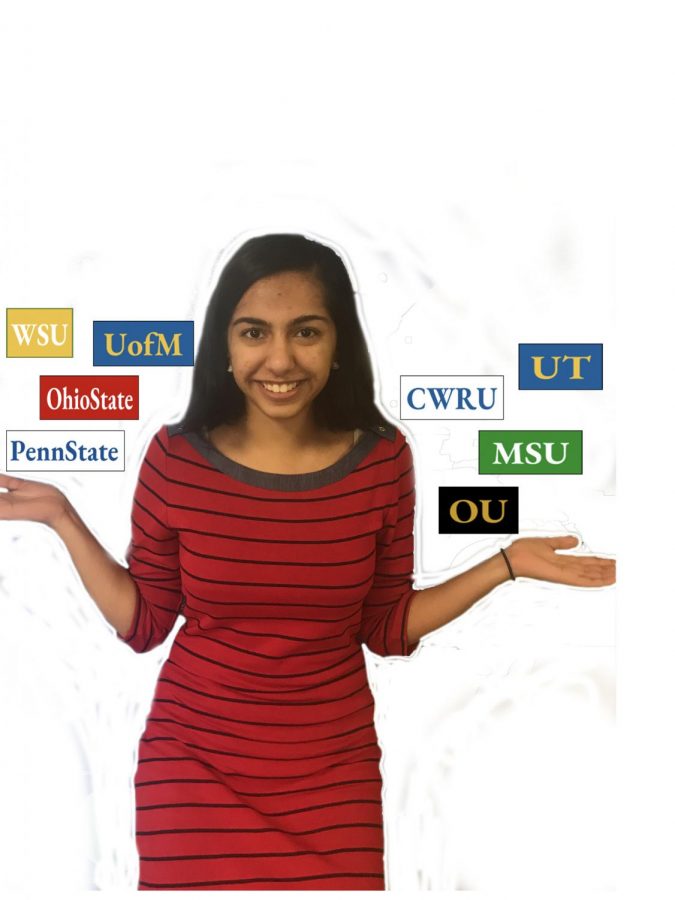Making college decisions
February 26, 2019
As the halfway point of the school year approaches, many seniors are on the edge of their seats waiting to hear back from the colleges they applied to. Among these students is senior Ishi Shukula, who has already received some answers, but is still awaiting decisions from institutions like the University of Michigan and Pennsylvania State University.
Shukla has applied to and is still applying to over 10 universities. She plans to pursue med school after a direct-med program or her pre-med undergraduate degree in her early college years.
“I really want to go into medicine, so I applied mainly to direct medical programs,” Shukla said. “That was my first goal because direct medicine kind of ensures you a spot in med school.”
Besides looking at different colleges’ various academic programs when applying to schools, Shukla had additional values in mind.
“I want to be able to go to a university with people who are similar to me but also different than me,” Shukla said. “Like, we bring different voices to the table, but at the same time, we have the same motivational level and the instinct to learn, which is why I applied to several of these universities.”
Many high school and even middle school students agree that they are put under a lot of pressure to do well in school and in extracurriculars to get into a good college. Shukla does not believe being accepted into a highly ranked university is as difficult as people make it seem.
“I will say is that I feel like sometimes, especially junior year I felt this, everyone makes it seem like it’s so hard to get into a good college, but I don’t think that’s true,” Shukla said. “You need to remember your own strengths and how they add up. I feel like in this day and age, a lot of kids compare themselves to their peers, and it might bring you down. Like ‘Oh, I didn’t do this’ but then you normally have done something else in place of that.”
At the same time, Shukla advises juniors to begin touring college campuses to get a feel for where they want to apply to in the next year.
“For juniors, [I would say to] start touring campuses and exploring programs that you’re interested in,” Shukla said. “And even if you’re an underclassmen, you can align your classes to what you really want to become.”
Mrs. Jennifer O’Toole- Seyka, one of Rochester High School’s counselors, agrees with Shukla about this idea.
“I think every sophomore should be on a college campus at least once,” Mrs. O’Toole- Seyka said. “I think junior year, you need to be visiting college campuses that you’ve researched more and then senior year, you should visit the one or two a second time to really narrow down your decision.”
For Shukla, narrowing down the colleges one wants to attend is the most difficult part of the application and decision process.
“One day you might ask me what I’m leaning towards, and it might be a different answer than the next day,” Shukla said. “I feel like I keep on going back and forth between colleges, so I feel like the most difficult part is narrowing down that list.”
However, other seniors, like Ayesha Sidikui, believe that the hardest aspect of applying to universities is submitting SAT scores and transcripts.
“Sending your transcripts and SAT scores [is the hardest],” Sidikui said. “Some people don’t understand exactly how to do it.”
Sidikui plans on getting a pre-med degree and then going to dentistry school. To do this, she wants to attend either Wayne State University, Oakland University or University of Detroit Mercy.
“My parents don’t really want me to move out before I get my undergrad, so those are close, and they’re really great schools and you save money,” Sidikui said. “[There aren’t any schools I was certain I do not want to attend] because all school you end up in the same place. It just depends on how hard you work.”
When Mrs. O’Toole- Seyka was applying to college, the financial aspect was a big part of her decision, and this remains true for many students today.
“The main big piece for me was I knew I was going to college,” Mrs. O’Toole- Seyka said. “I didn’t know or truly care what college I was going to, and financially I just knew that I didn’t want to have a large amount of debt.”
Unlike Shukla and Sidikui, senior Allie Maresh is interested in criminology, law and engineering. She applied to Oakland University, Michigan State University, Central Michigan University, Grand Valley State University, and University of Michigan.
“I applied to CMU and OU really because I wanted to see how much money they would offer,” Maresh said. “GVSU and MSU I applied to because I really want to go to one of them because I love their campuses and programs.”
Although Maresh has a few different colleges in mind, there were a few she knew for sure that she did not want to attend and one she is leaning towards.
“[I did not want to go to] any college in a city [like] Wayne, Loyola, U Chicago, because I hate big cities,” Maresh said. “[I am leaning towards] Michigan State. I love the campus, and my mom went there and loved it.”
College is the traditional post- high school route, but it is is not the only one. Trade schools and military academies are growing in popularity, and Rochester High School even offers its students exposure to such options through programs like OSTC.
“We have a significant number of people that should consider trade schools, men and women, because there are so many good paying jobs available with high demand,” Mrs. O’Toole- Seyka said. “If we look at it, there’s two years certificate programs… that are people are starting off making $60,000 a year, so there’s lots of options.”
According to Mrs. O’Toole- Seyka, picking a career should be the first step taken in deciding what college or further education program to attend, not the other way around.
“I think too many people think very single-mindedly ‘bachelor’s degree’,” Mrs. O’Toole- Seyka said. “You always need to think of career first, and then figure out, through your resources or counselor, how to get to that career.”
Mrs. O’Toole- Seyka recalls not being exposed to very many careers growing up due to where she lived, and she thinks had she been more educated about career choices, she would have found another passion to pursue.
“I didn’t know enough about careers myself being from the very small town that I lived in,” Mrs. O’Toole- Seyka said. “We had very little careers. People were working for the car company either on the line or some managerial positions, we had farmers, we had different trades and that’s about everything that we had in our area, so my exposure to what I had was extremely limited. If I were to grow up in an area such as this I think I would have seen so many other career options and potentially taken a different path.”
RHS offers a program to upperclassmen called OSTC. OSTC is an option juniors and students have to leaves RHS for the last half of the day and gain hands-on experience elsewhere.
“I chose OSTC because I want to go into computer programming,” junior Robby Shaw said. “I believe taking the classes there will better prepare me for the future career I want to pursue.”
Through OSTC, Shaw has met classmates who have similar goals as he does and has been able to make new friends because of this.
“I love the new people I have met,” Shaw said. “[I have] befriended a minimum of five new people, and it’s great because we all have stuff in common.”
In addition to inquiring about the different programs and classes RHS has to offer for those who want to take a different route, Mrs. O’Toole- Seyka’s advice is to contact local businesses and get a feel for what they do through job shadowing.
“If you think you might think that graphic design looks cool, get on the telephone and call up a graphic design shop and say ‘can I come in and check this out for two hours?’,” Mrs. O’Toole- Seyka said. “Talk to your parents and [ask if they have connections]. This takes zero commitment, except for a little bit of time, and zero money. You’ll actually potentially save yourself a ton of money if you got out there and saw what the job looks like.”
As the school year’s end inches closer, seniors like Shukla are getting ready to say their goodbyes and welcome their post high school lives. No matter what path someone ends up on after high school, Shukla has some advice.
“Don’t limit yourself,” Shukla said. “I know I want to do medicine, and a lot of people are like ‘Oh, but that’s so long’ or ‘Oh it’s too much work’. The minute you say [that], you’re limiting yourself. So you need to remember that you should not be your own limit. Your brain is capable of so much more amazing things. Don’t limit yourself, but allow it to become whatever.”





